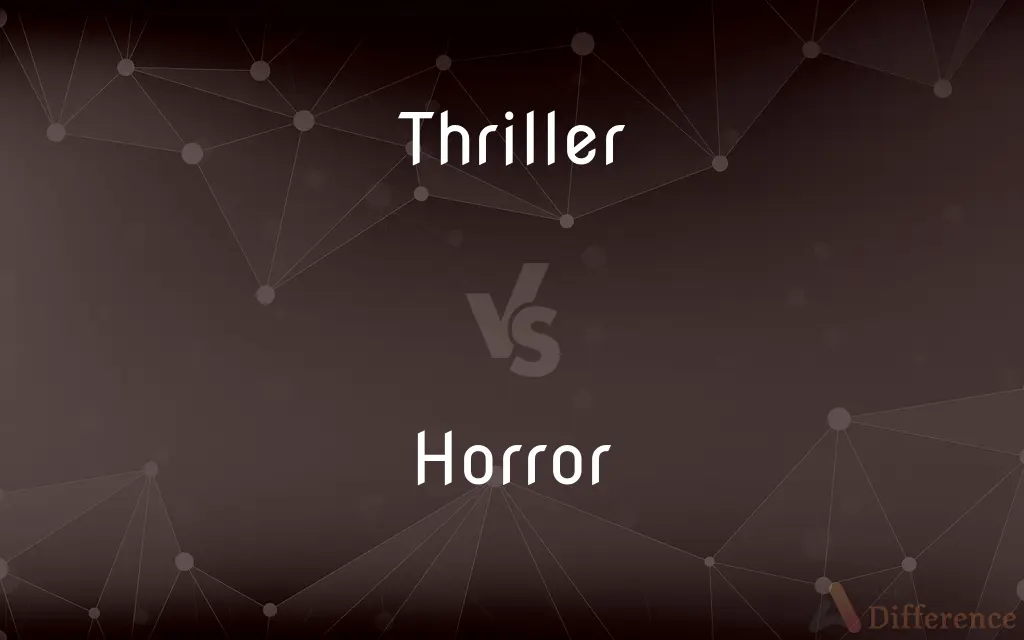Thriller vs. Horror — What's the Difference?
By Maham Liaqat & Fiza Rafique — Updated on April 19, 2024
Thriller films focus on suspense, tension, and excitement, while horror films aim to evoke fear, disgust, or horror through supernatural elements or shocking imagery.

Difference Between Thriller and Horror
Table of Contents
ADVERTISEMENT
Key Differences
Thriller films are characterized by the suspense and tension they build, keeping audiences on the edge of their seats. Whereas, horror films primarily aim to evoke fear and often include supernatural elements or extreme situations.
Thrillers often rely on the psychological tension and the unpredictability of the plot to engage viewers. On the other hand, horror focuses more on creating an atmosphere of dread and often includes jump scares and graphic imagery.
Thriller narratives are typically rooted in reality, featuring scenarios that could happen in real life, such as espionage or crime. While, horror frequently delves into the supernatural or fantastical, with monsters, ghosts, and otherworldly creatures.
Thrillers usually culminate in a climax that resolves the central mystery or conflict, often with a twist. Whereas, horror films may end with a resolution that is either tragic or leaves room for ambiguity, focusing on the survival or defeat of characters facing unnatural forces.
Thrillers are designed to provoke thought and speculation, leading to viewer involvement in solving the mystery. On the other hand, horror aims to provoke a visceral reaction, such as shock or disgust, from its audience.
ADVERTISEMENT
Comparison Chart
Primary Emotion
Suspense, Excitement
Fear, Dread
Plot Focus
Realistic, Possible Scenarios
Supernatural, Fantastical Elements
Audience Engagement
Psychological involvement, Problem-solving
Emotional, Physical Reaction (e.g., jump scares)
Typical Ending
Resolution of Mystery, often with a twist
Often tragic, ambiguous, survival-focused
Key Elements
Tension, Stakes, Anticipation
Monsters, Ghosts, Shocking imagery
Compare with Definitions
Thriller
A genre focused on creating tension and suspense.
The thriller had viewers anxiously guessing the villain’s next move.
Horror
Often features supernatural elements.
The horror story involved a haunted house and malevolent spirits.
Thriller
Often incorporates elements of crime or espionage.
The political thriller explored themes of power and betrayal.
Horror
May include themes of survival against dark forces.
The characters in the horror film struggled to survive against a zombie apocalypse.
Thriller
Keeps audiences on the edge of their seats.
The thriller's fast pace kept the audience captivated.
Horror
A genre designed to frighten and horrify the audience.
The horror film used eerie music to heighten the sense of dread.
Thriller
Builds towards a climactic twist or revelation.
The final twist in the thriller shocked everyone.
Horror
Aims to provoke a visceral reaction.
The graphic scenes in the horror movie were intensely disturbing.
Thriller
Involves high stakes and complex characters.
In the thriller, the spy must navigate a web of deception.
Horror
Utilizes shock, gore, and intense imagery.
The horror film’s use of shocking imagery left viewers uneasy.
Thriller
One that thrills, especially a sensational or suspenseful book, story, play, or movie.
Horror
An intense, painful feeling of repugnance and fear.
Thriller
Something that thrills.
Horror
A state or condition marked by this feeling
Stood in horror looking at the scene.
Thriller
A suspenseful, sensational genre of story, book, play or film.
Horror
An intense dislike or abhorrence
Had a horror of being forced to play charades at the party.
Thriller
A suspenseful adventure story or play or movie
Horror
A cause of horror
"The creature that had seemed a horror in its box was, up close, a figure of sorrow" (Paul Theroux).
Horror
A genre of fiction or other artistic work evoking suspense and horror, especially through the depiction of gruesome or supernatural elements.
Horror
A work of this genre.
Horror
(Informal) One that is unpleasant, ugly, or disagreeable
That hat is a horror.
Horror
Horrors(Informal) Intense nervous depression or anxiety. Often used with the.
Horror
An intense distressing emotion of fear or repugnance.
Horror
Something horrible; that which excites horror.
I saw many horrors during the war.
Horror
Intense dislike or aversion; an abhorrence.
Horror
(uncountable) A genre of fiction designed to evoke a feeling of fear and suspense. Category:en:Horror
Horror
(countable) An individual work in this genre.
Horror
A nasty or ill-behaved person; a rascal or terror.
The neighbour's kids are a pack of little horrors!
Horror
(informal) An intense anxiety or a nervous depression; often the horrors.
Horror
A bristling up; a rising into roughness; tumultuous movement.
Such fresh horror as you see driven through the wrinkled waves.
Horror
A shaking, shivering, or shuddering, as in the cold fit which precedes a fever; in old medical writings, a chill of less severity than a rigor, and more marked than an algor.
Horror
A painful emotion of fear, dread, and abhorrence; a shuddering with terror and detestation; the feeling inspired by something frightful and shocking.
How could this, in the sight of heaven, without horrors of conscience be uttered?
Horror
That which excites horror or dread, or is horrible; gloom; dreariness.
Breathes a browner horror on the woods.
Horror
Intense and profound fear
Horror
Something that inspires horror; something horrible;
The painting that others found so beautiful was a horror to him
Horror
Intense aversion
Common Curiosities
What are common themes in horror films?
Common themes include fear of the unknown, survival against dark forces, and the intrusion of the supernatural into the everyday world.
How do horror films affect the audience?
Horror films are designed to provoke a strong emotional response from the audience, typically fear, dread, or horror.
What role does setting play in thrillers and horror films?
In thrillers, the setting is often realistic and integral to the plot, such as a war zone, political capital, or urban cityscape, enhancing the sense of danger and realism. In horror films, settings like haunted houses, isolated cabins, or creepy towns are chosen to amplify the sense of fear and isolation.
Are thrillers and horror films aimed at different audiences?
Thrillers and horror films can appeal to overlapping audiences but generally cater to different preferences. Thrillers attract those who enjoy a mental challenge and tension, while horror appeals to those who enjoy the emotional roller coaster of fear and shock.
Can thrillers include supernatural elements?
While thrillers typically focus on real-world scenarios, some blend genres and include supernatural or fantastical elements.
Do thrillers always involve crime or espionage?
Many do, but thrillers can also explore other themes like psychological conflict or moral dilemmas in high-stakes situations.
What is the impact of music and sound in thrillers versus horror films?
In thrillers, music and sound are often used to build tension and heighten anticipation, subtly guiding the audience’s emotional responses. In horror films, sound is crucial in creating an atmosphere of dread and often precedes or accompanies moments of shock or horror.
What typically distinguishes a thriller from a horror film?
Thrillers focus on psychological tension and realistic dangers, whereas horror films emphasize supernatural elements and evoke fear.
Can a movie be both a thriller and a horror film?
Yes, some films blend elements of both genres, using the realistic tension of thrillers with the supernatural elements of horror to create a gripping, fearful experience. Examples include films like "Silence of the Lambs" or "Se7en."
How important are the characters in thrillers versus horror films?
Character development is crucial in thrillers, as the story often revolves around their decisions and psychological makeup. In horror, while character development can enhance the story, the focus is more often on the situation and the characters' reactions to supernatural or horrific events.
Share Your Discovery

Previous Comparison
Monarchy vs. Patriarchy
Next Comparison
Poorly vs. SickAuthor Spotlight
Written by
Maham LiaqatCo-written by
Fiza RafiqueFiza Rafique is a skilled content writer at AskDifference.com, where she meticulously refines and enhances written pieces. Drawing from her vast editorial expertise, Fiza ensures clarity, accuracy, and precision in every article. Passionate about language, she continually seeks to elevate the quality of content for readers worldwide.
















































